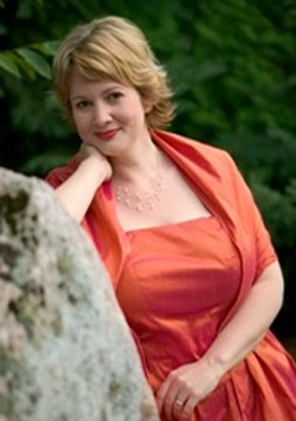Susan Platts lifts Philharmonic program with Mahler songs
An ambitious program of Wagner, Mahler and Richard Strauss unfolded at Evanston’s Nichols Concert Hall Sunday afternoon, as the Chicago Philharmonic presented the latest installment in their season-long series “The Romantic Impulse.”
The three composers (with a dash of Lully tossed in as reference material) were represented by a trio of their finest works performed with varying effect to a capacity audience at the Music Institute’s sonically bright concert hall.
The program opener was a lovingly crafted performance of Wagner’s most tender music, the Siegfried Idyll. The orchestra, under music director Scott Speck, was on good form both technically and dramatically. The ensemble maintained a sparkling chamber texture from the quiet beginning through to the dwindling conclusion. The players brought the interlacing themes and musical references to rhapsodic climaxes and performed with mostly admirable precision. A few uncertainties in the brass didn’t substantially disturb the overall arc of the performance.
The highlight of the afternoon was the performance by Susan Platts of Mahler’s Ruckert Lieder. This collection of five sparely orchestrated songs contains some of Mahler’s finest and most affecting small-scale music.
This music stands or falls on the quality of the vocalism and the Canadian mezzo-soprano’s rich tones more than filled the bill. Her poetic interpretation and precise diction showed a deep understanding of the texts at all levels.
She captured the playfulness of Blicke mir nicht in die Lieder (Look not into my Songs) and turned in a deeply satisfying performance of the masterwork of the sequence Ich bin der Welt abhanden gekommen (I Have been Lost to the World) with its haunting English horn solos.
The very intense ending of Im Mitternacht (At Midnight) proved a test as she was almost overpowered by the brass. Under Speck’s direction, the ensemble had its share of glitches and wobbles technically but it was a pleasure to hear the interaction of voice and instrument in this somber testament to Mahler’s genius.
The second half of the program was devoted to Strauss’ incidental music to Moliere’s Bourgeois Gentilhomme, a cornucopia of Straussian delights with two actors from The University of Chicago’s Court Theater, Matt Schwader and Hilary Clemens, who performed skits based on texts from the original play in between some of the musical sections.
The would-be gentleman as rubber-faced jive-talking rapscallion got the best laughs learning his vowels and discovering that he was talking prose all along. But good humor aside, the question is does this kind of mixture really work in a concert setting? Of course it depends on the occasion, but in this performance the comedy’s prose didn’t fit with the music.
The Strauss Suite is a collection of incidental music with minimal interconnection but major reference to stage action. The music is elegant and sophisticated, combining rich orchestration and varied incidents featuring many solo turns. The performance began briskly and was never less than committed, although the playing became less polished as the work progressed, and technical lapses abounded. In this context the Moliere bits – and the Lully excerpts from his Bourgeois Gentilhomme music as well – seemed extraneous.
Despite the passing blemishes, music director Speck demonstrated a fine command of the musical substance of the Wagner and Strauss works and was a sensitive accompanist in the Mahler. For this performance the Philharmonic’s indisposed concertmaster David Perry was replaced by Isabella Lippi, the fine concertmaster of the Elgin Symphony Orchestra.
Posted in Performances


